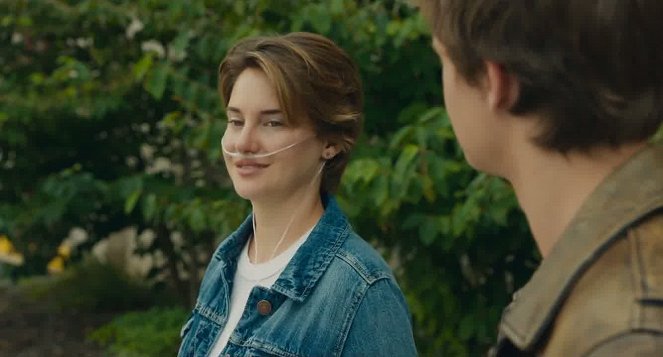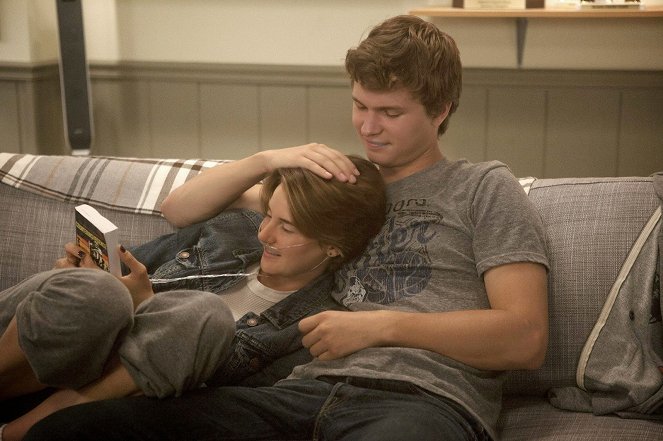Directed by:
Josh BooneCinematography:
Ben RichardsonCast:
Shailene Woodley, Ansel Elgort, Willem Dafoe, Laura Dern, Nat Wolff, Lotte Verbeek, Sam Trammell, Mike Birbiglia, Maurice Nathan Weert, Emily Peachey (more)VOD (3)
Plots(1)
Hazel and Gus are two teenagers who share an acerbic wit, a disdain for the conventional, and a love that sweeps them on a journey. Their relationship is all the more miraculous given that Hazel's other constant companion is an oxygen tank, Gus jokes about his prosthetic leg, and they met and fell in love at a cancer support group. (official distributor synopsis)
(more)Videos (18)
Reviews (11)
In the context of the melodramatic “sick flick” subgenre, The Fault in Our Stars is satisfactory as only a film about dying teenagers can be. The creation of endings as one of the primary means of “making sense” of our existence is cleverly elevated to a leitmotif of the narrative, which from the opening words is presented as story about a story (or rather about making up stories). In Hazel’s case, the desire for a concluded narrative and control over her own story is strengthened by her illness. (In the director’s cut, Hazel’s transformation from the subject of the narrative to the subject conveying the narrative is more pronounced thanks to the scene in the ambulance, where she comes up with the continuation of the poem for Gus). The protagonist is motivated by a need similar to that which we as viewers satisfy by watching fictional stories. Due to the fact that our lives will end without us being able to add anything to them, fictional narratives serve as simulators that reconcile us with our own mortality. Melodrama most strikingly exploits the tension between fear of the end and the need to give that end a clearer form. The Fault in Our Stars is not satisfied with the helplessness of the essentially good characters (or those that are willing to change for the better) who are facing a terminal illness and attempts to reflect the aforementioned quality of melodrama on multiple levels. Though it’s true that the film bears all of the hallmarks of midcult filmmaking (parasiting on serious issues, audio-visual attractiveness, wrapping banal ideas up in dubious and important-sounding speeches, superficial characters), it achieves a more powerful emotional effect than many other, similar films thanks to its use of simple narrative devices. Credit is due mainly to the believable young actors and the screenplay, which is artful enough that you believe it rises above the clichés of Hollywood tearjerkers (though it does in fact jerk every last tear). Due to the ingenuity with which the film strives to convince us through flashes of black humour and the signs of unwillingness to play by the established genre rules that it is not just another run-of-the-mill melodrama, I gladly let myself be moved by The Fault in Our Stars. Maybe I’m becoming a softy. Or maybe I’m no longer such a cynic (and chauvinist) that I would reject a well-thought-out “chick flick” on principle. 65%
()
I was getting ready to watch this movie with my girlfriend for quite some time. It is advisable to prepare some tissues and steel your nerves before watching this movie, which tells a story of people where you already know in advance what is awaiting them. And it is nothing pretty. All the more surprised I was by the natural and nice way the story was told in. I also like it when Americans travel to Europe, so I enjoyed that part of the movie as well. The finale is nerve-wrecking, depressing and so on, but what else could you expect from a film like this? Luckily, the ending did not make me as sad as I was worried it would, so I think the movie managed this part perfectly.
()
It's not the power of the premise or the media hype that makes this quality film a hit. What would The Shawshank Redemption be, with its potential for acting, plot and ideas, if it were filmed conventionally, aimed solely at reliable and convenient one-dimensional themes, and if it relied solely on all audiences having enough humanity and automatic empathy to appreciate it simply because it carries a laudable message? The Fault in Our Stars has a great cast and a commendable idea, but it's kitsch of the coarsest grain, which I have no need to see again in my life and which, despite all the cute faces and touching hugs, failed to tell me anything new. Both love and death are a given in life, and there are many other films that make me appreciate the former indescribably more and take the latter as a harmless, if unwelcome, companion. 65%
()
And damn, how I was looking forward to getting that done. The posters, the trailers, the whole story (two barely-hairy people winning cancer and a heap of love), and the obligation to see this film sounded to me like the news announcing that a cacodemon has emerged from the depths of the earth and the country is in for a thousand years of agonizing tyranny. But hell isn't happening. While The Phallus in Our Stars mixes suburban teen melodrama with the gravity of terminal illness, and manages to wring just about everything out of the subject matter in a fairly merciless running time, the flip side of the film is a rather refreshing Reitman-esque comedy that thankfully allows the characters to do a lot more speaking and acting rather than letting themselves get dragged through the IV and stare at the wall in anticipation of the inevitable. The protagonists are not just tolerable, but instead likeable, intelligent, and self-deprecating. The tearful valley of the last half hour is survivable precisely because of the relationship we've made with them in the first hour and a half, where she cancer was still somehow all right and cool. Not to mention that it makes the immanent presence of death work, which in some places is pleasantly beyond the comfort zone. Faulty Stars has a lot of problematic scenes (the whole Anne Frank sequence, the eulogy, the letter ex machina) and a lot of very pleasantly atypical ones (Hazel's unsentimental father, the discussion with the writer in Amsterdam) and can be hated more or less just as easily as loved. It strikes me as ideal on a romantic level, especially as a counterpoint to Meyer's opuses, where everyone stares and sighs into the distance with a shattered soul at the curse of eternity, while here there is talk and jokes in a close encounter with the non-existence of life after death. If I were sixteen, I'd be all over this movie.
()
I had heard a lot of things about this film from various sources, but I delayed watching it for a long time, as I suspected that it would push a lot of emotions, since the main themes are young people suffering from serious illnesses, so it was to be expected that there would be a grim reaper hanging around. In the end, it's a kind of bittersweet film where on the one hand you watch the characters enjoying the time they have left, while on the other hand there is the presence of impending death, which unfortunately is not a choice. I probably wouldn't watch it again, but I can still recommend this film. In short, a film that shows the fact that serious illness and death are not a matter of the older generation alone, and that it is important to enjoy every day to the fullest.
()



Ads